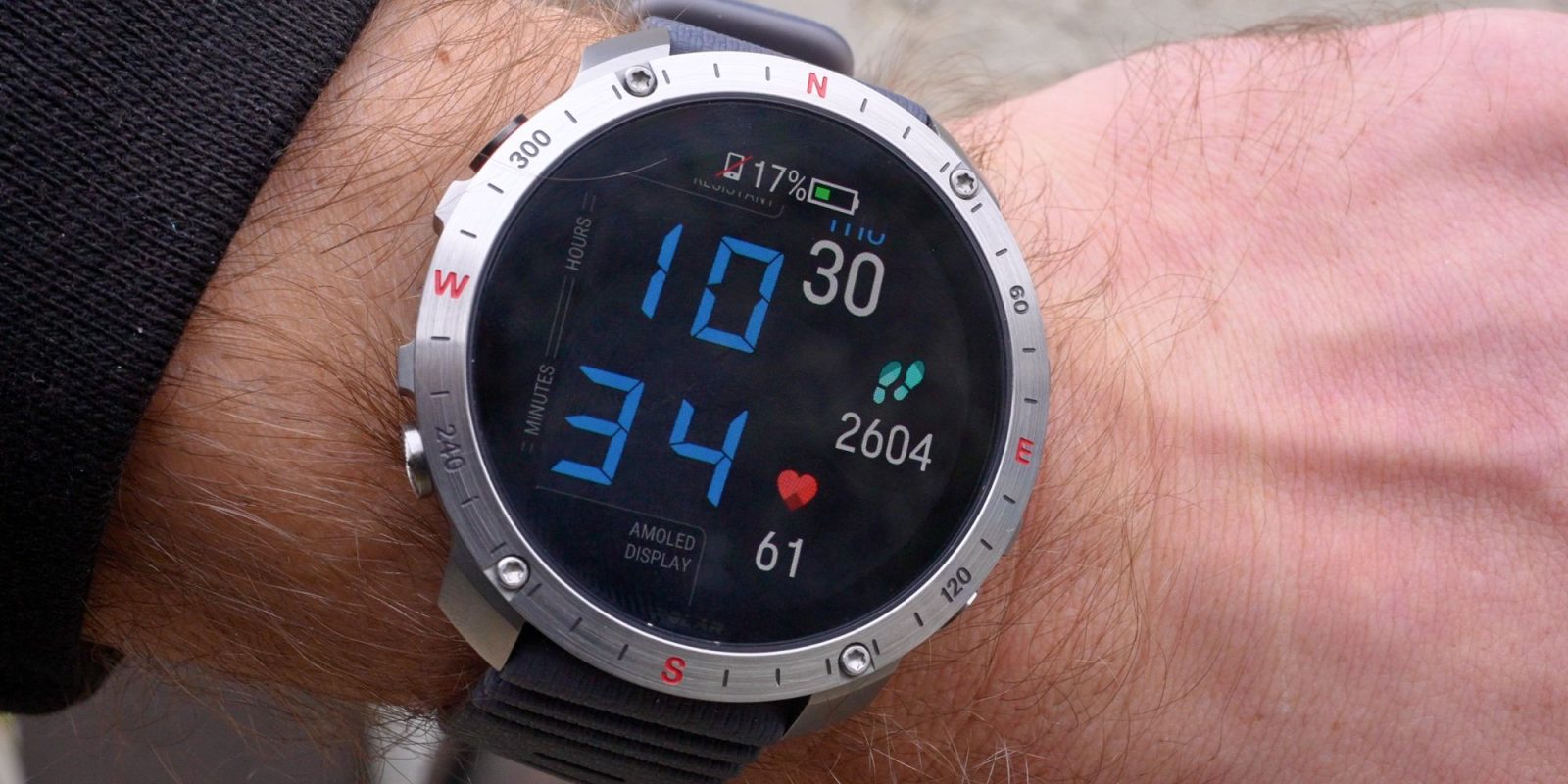
The Polar Grit X2 Pro brings some significant upgrades over its predecessor. There is an improved heart rate sensor, global offline maps, a faster processor, and an excellent AMOLED display. Unfortunately, there has also been a substantial $200 price increase, with the base model now starting at $749 USD.
Is the upgrade worth the cost? Read or watch our review below to get the full scoop.
Table of contents
Polar Grit X2 Pro – video review
Subscribe to Connect The Watts for more connected fitness news, updates, tips, and guides.
Polar Grit X2 Pro – specs
| Display Size | 1.39 Inch |
| Physical Size | 48.6 x 48.6 x 13.4mm |
| Display Type | AMOLED, 454 × 454 Resolution Always-On-Display |
| Screen Material | Sapphire Glass |
| Bezel & Cover Material | Stainless steel |
| Wrist Strap | 22mm Silicone |
| Weight | 79g w/Silicone Band 57g without band |
| Phone & Accessories Connection | Bluetooth |
| GPS | All-satellite Dual-frequency |
| Navigation | Turn-by-Turn Directions Pre-loaded global Maps |
| Sensors | ECG SpO2 Skin Temp Heart Rate Barometer Magnetometer compass Accelerometer |
| Water Resistance | WR100 (100 Meters) |
| Storage | 32GB |
| Battery Life | Performance training mode: 43 h Eco training mode: 140 h Smartwatch mode: 10 d |
| Warranty | 2-year limited warranty |

Polar Grit X2 Pro – design
Display
The new AMOLED touchscreen on the Polar Grit X2 Pro is protected by scratch-resistant sapphire glass, and is a huge upgrade compared to its previous Memory-in-Pixel display. The screen looks bright, clear and most importantly, is easy to read in both bright and dark environments.
Thanks to a faster processor, the touchscreen is also more quick and responsive to use. Surrounding the AMOLED screen are five buttons that can be used to access everything as well, which I like since it gives users options for how they interact with the watch.
The Polar Grit X2 Pro comes with several watch faces to choose from, each of which can be further customized for both color and data shown. They look decent for the most part, but I think it would be great to have a few more options.

Battery
While the AMOLED screen looks great, it does come at a cost to battery life. While the Polar Grit X2 Pro still claims the 10 days of battery life as its predecessor, that is really only if you keep the display settings set to ‘Gesture-based’ instead of ‘Always-on’. If you prefer to have the display set to ‘Always-on’ (as I do), then you can expect the battery life to be about half that.
Durability
The Polar Grit X2 Pro is very well built, and extremely durable. With sapphire glass protecting the display, in addition to a stainless steel bezel and cover, it can handle pretty much any activity without issues.
It is also rated at WR100, so can be used in the water at depths as deep as 100 meters.

Polar Grit X2 Pro – sports and health tracking
The Polar Grit X2 Pro comes with 20 different sport profiles which can each be customized to display your preferred data, with a 4 data field limit per screen.
When choosing a sports profile, you can also enable heart rate sensor broadcasting to connect with 3rd party accessories (Zwift, Peloton, etc..). One minor annoyance here is broadcasting isn’t a permanent setting, so you have to manually turn it on for each activity.
Heart Rate Accuracy
Like the recently released Polar Vantage V3, the Polar Grit X2 Pro comes with their improved heart rate sensor.
In my testing (which included more biking than running this time around due to a minor calf injury), I found the accuracy to be pretty solid improvement over its predescessor. It wasn’t perfect though, as there were some workouts where it would completely miss a few intervals where my heart rate would jump up quickly. Also on occasion it would fall off track for about a minute for no reason, but those instances were pretty rare overall.

GPS Accuracy
The Polar Grit X2 Pro includes dual-frequency GPS, alongside a new antenna design and algorithm. With my testing, I found the accuracy to be extremely solid.
In most cases, the GPS accuracy was in-line other high-end sports watches I tested it against (Garmin Enduro 2, Apple Ultra). And in some instances, it actually outperformed the rest, so I was very happy with the results from Polar here.

Navigation
The Polar Grit X2 Pro comes with global offline maps, and navigation when connected to either a Strava or Komoot account. Komoot offers the better integration of the two because of the included turn-by-turn navigation.
While the basic maps are already installed, you can also download more detailed maps of your area through the Polar website and install them by connecting the watch to your computer.
If you have a route from Komoot loaded, you will get turn-by-turn notifications on the watch and if your phone is connected, it can also give voice guidance. Overall, the experience is pretty great, and one of the best sports watch navigation systems out there.
The only downside is when Polar occasionally asks you to recalibrate the compass. When this happens, you have to rotate your wrist around as you rotate a ball on screen, which doesn’t sound that bad until you have it. Because for some reason, I struggle to get the calibration to work and often am standing outside rotating my wrist in strange ways like a fool well for over a minute. It’s not a one-and-done calibration either as the watch forces you to repeat this again every handful of runs.

Step Count Accuracy
So normally I don’t really pay that much attention to the accuracy of step counts for sports watches, as they generally are all similar. But in this case I need to mention it because the step count accuracy is all over the place on the Polar Grit X2 Pro.
It seems that Polar has decided to include all activities into the step count, so there were days where my step count would have 2X or even 3X what it should be. I like to track my steps apart from my other activities since there are benefits to walking more than just burning calories. I get that some people may like to have other workouts counted to their ‘step goals’, but I’m just not onboard with it. This might be a “me” issue but I imagine there must be at least some others who feel the same way.

Sleep and HRV Accuracy
Overall, Sleep accuracy is on point compared with other sportwatches. I don’t generally trust any monitor sleep type (deep, REM, light) as none are very accurate, so I mostly just want to see a correct time when it comes to falling asleep and waking up.
More importantly is Heart Rate Variability (or HRV) tracking as that is the number I look at daily to help determine my recovery. This is where Polar really excels, because unlike most other sports watches, Polar more heavily weighs your HRV closer to when you wake up. This means the HRV score given here, in my opinion, is more accurate and reliable.
In fact when it comes to automatic HRV tracking, Polar and WHOOP are the only wearables I fully trust day-to-day. Unlike WHOOP, Polar doesn’t require a subscription and also includes a lot more workout tracking features, so for this reason I often suggest Polar to those looking to better track their recovery.

Polar Grit X2 Pro – final thoughts
While the improvements that have been made to the Polar Grit X2 Pro are great, its $200 price increase is still a big hurdle to get over. Especially considering that this watch is essentially the same as the $599 Polar Vantage V3, but with the more durable sapphire screen and stainless steel bezel.
At $749, it is in a price range that for a watch, while very accurate, currently does not offer as many features as other options. The one area it does excel above the rest is in its HRV tracking accuracy. That is not insignificant and those who care about HRV tracking may want to choose Polar for that reason alone.

Suggested articles:
- WHOOP Band – why I’m still wearing it after two years
- COROS Vertix 2S review: A small, yet impressive upgrade
- Ultrahuman Ring AIR Review – is it better than Oura?
FTC: We use income earning auto affiliate links. More.


